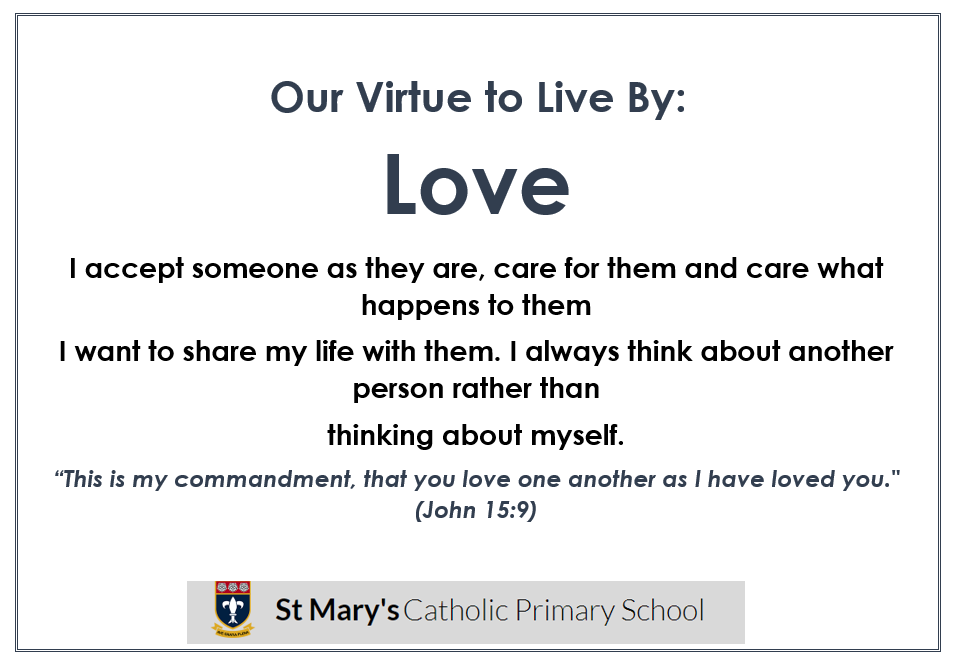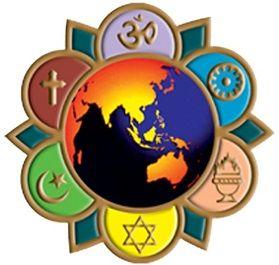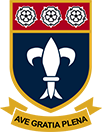Religious Education
Mission statement
At St Mary's we walk together with Christ, to achieve our potential,
helping one another to love, care, smile and learn.
Let your light shine.
Religious Education at St. Mary's
"The mission of schools and teachers is to develop an understanding of all that is true, good and beautiful."
- Pope Francis
Intent:
- To present engagingly a comprehensive content that will lead our pupils to a fuller understanding of Gospel values.
- To promote the dignity and the freedom of all those who belong to our school community as being created in the image and likeness of God.
- To promote religious knowledge, understanding and skills in our children so they are able to think spiritually, ethically, theologically as is appropriate for their age and ability and be able to communicate this effectively.
- Help the children become increasingly aware of the demands of religious commitment in every day life.
- Provide a welcoming, caring, safe Christian environment where children can develop self respect, integrity, a sense of individual worth so they are able to co-operate with and show consideration and tolerance for others.
- To prepare our children so they have the confidence to make a critique about the underlying trends in contemporary culture and society.
- To raise pupils’ awareness of the traditions of other religious communities in order to respect and understand them.
- To ensure that the three elements of Religious Education, Catechesis and Evangelisation co-exist, providing mutual support and reinforcement.
Implementation:
Children walk into an R.E lesson and it instantly feels special. A key focal point (for example an artefact, candle, image to provoke thoughts) greets the children with calm music and prepares the children for the start of their learning. Teachers use the Come and See Programme of Religious Education as their main resource that they then develop and enhance to meet the needs of their children and create exciting and engaging lessons.
Central to the programme are three basic human questions and the three Christian beliefs that are the Church’s response in faith:
Where do I come from? Life – Creation
Who am I? Dignity – Incarnation
Why am I here? Purpose – Redemption ...within the Catholic tradition
Links are made with pupils’ own experiences and with universal experiences and other religion traditions.
The Come and See Programme includes objectives and learning intentions which take into account the religious and educational needs of our children:
From supportive Catholic homes
For whom the school may be the first, or only, experience of church From other Christian traditions
From other religion backgrounds
The programme helps the children to:
Raise questions
Provide material for reflection
Explore the beliefs, values and way of life of Catholic tradition Deepen and enrich the understanding of their faith
Children are taught three other religions throughout the academic year:
Judaism during the autumn term
Hinduism during the spring term
Islam during the summer term
Impact:
Religious Education is the core subject central to the life of St. Mary's, is given 10% of curriculum time and has the full support of management in its delivery, resourcing and development.
It is a subject, predominantly through the delivery of the programme ‘Come and See,’ which respects and promotes the child’s innate capacity for wonder, awe, reverence, imagination and the spiritual.
It is a curriculum subject in its own right; is a rigorous, academic discipline to be taught, assessed, developed and resourced with the same commitment as other curriculum subjects.
It provides opportunities for prayer, celebration, investigation and reflection.
It provides children with the language of religious experience in the form of religious activities, places, stories, symbols, rituals, people and objects.
It presents systematically the Christian way of life and introduces doctrine in ways appropriate to the age and stage of development of the child.
It provides staff with relevant in-service so that they are confident to deliver high quality teaching to support excellent pupil progress.
It underpins all other school policies so that they reflect Gospel values and contributes positively to the broad and balanced curriculum through co-operation and dialogue with other subjects.
It endeavours to interpret relationships in school in the light of the teachings of the church and strives to encourage and celebrate forgiveness, trust, respect and Christian love in all aspects of school life.
Virtues to Live By
At St. Mary's, we are following 'Virtues to Live By' which reminds us of Jesus' words and His advice on how we should live our lives by loving God and each other. The virtues we follow, help us to make sure we are following these commandments and living them out each and every day. We have 3 'Virtues' for each term that are our focus. Our current 'Virtue to Live By' is Love.

Our Current RE Topic Display Boards:
religious-education
Useful Links:
Our trip to Sheffield Jewish Centre!
This week, Years 4, 5 and 6 had a wonderful time learning all about the Jewish faith! We were given a talk by Rabbi Golomb who was amazing with the children and described to them the importance of Judaism and all it's links to our own faith too.
The children were given a tour of the centre and we were able to see artefacts from the Jewish faith as well as a little role play too!
The children asked wonderful questions and found the whole day fascinating and really got involved with the day. Due to this visit, the children were able to produce some wonderful pieces of both written and creative work and the information that they gained from the day, shone through in their work!
Judaism Week!
The children really enjoyed learning about the Jewish faith as part of the school's dedication to teaching and informing them about other religions and cultures.
Year 4 particularly enjoyed learning all about the significance of the Torah and writing their own prayers in Hebrew!
Our Trip to Doncaster Mosque!
Year 2 and 3 were lucky to have the experience of visiting Doncaster Mosque as part of building up the ch knowledge of other faiths!
Year 2 and 3 were warmly welcomed by the people sat Jamal Mosque in Doncaster. All the children gained valuable knowledge from the experience and couldn't speak highly enough of the opportunity!
All children engaged well and asked some very insightful questions. They listened well to the leaders who spoke and were very respectful during prayer time.
They were also given many gifts to take back to school, such as a Prayer Mat, Sweets and a Qu'Ran. It was a lovely day and we look forward to being able to visit again!
Doncastor Mosque Visits St. Mary's!
EYFS and Years 4, 5 and 6 were very lucky to have two special visitors come and talk to them all about the Islamic faith! The talk was wonderful and the children were fully engaged, asking thought provoking questions and listened intently as they found out all about Islam including what the 5 Pillars are, what a prayer mat is used for and why Mecca is such a special and Holy place!
We cannot thank Syed for not only helping to organise the trip to the Mosque with Years 2 and 3 but also for coming and talking to our children through his wonderful presentation!






























